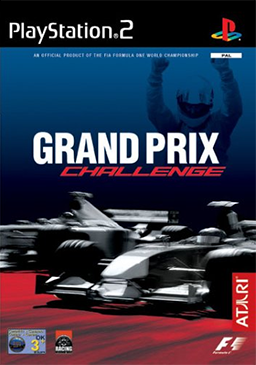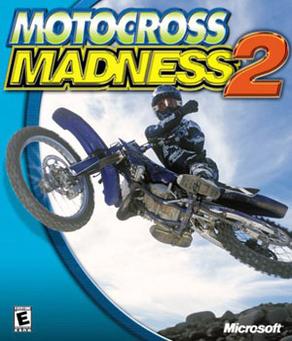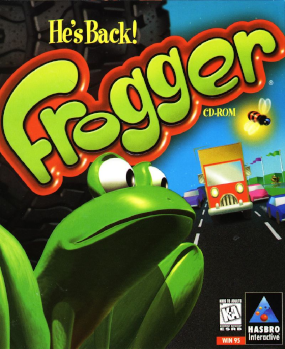
Halo 2 is a 2004 first-person shooter game developed by Bungie and published by Microsoft Game Studios for the Xbox console. Halo 2 is the second installment in the Halo franchise and the sequel to 2001's critically acclaimed Halo: Combat Evolved. The game features new weapons, enemies, and vehicles, another player character, and shipped with online multiplayer via Microsoft's Xbox Live service. In Halo 2's story mode, the player assumes the roles of the human Master Chief and alien Arbiter in a 26th-century conflict between the United Nations Space Command, the genocidal Covenant, and the parasitic Flood.

Midtown Madness is a 1999 racing game developed by Angel Studios and published by Microsoft for Microsoft Windows. The demo version was released in April 1999. Two sequels followed, with Midtown Madness 2 released in September 2000 and Midtown Madness 3 released in June 2003 for the Xbox. The game is set in Chicago; the object is for the player to win street races and obtain new cars.

Pokémon Dash is a racing video game developed by Ambrella for the Nintendo DS. It was a launch title both in Japan and Europe. Dash was released in Japan on December 2, 2004; Europe on March 11, 2005; North America on March 13, 2005; and Australia on April 7, 2005. It was the first Pokémon game to be released for the Nintendo DS.

Grand Prix Challenge is a Formula One racing video game developed by Australian developer Infogrames Melbourne House and published by Infogrames for PlayStation 2. It was released in Europe on 22 November 2002, and was officially licensed by Formula One Administration. It was later released on 28 February 2003 in New Zealand and Australia, 3 March in North America and 22 May in Japan.

V-Rally is a racing video game developed by Infogrames Multimedia and released for the PlayStation console in 1997. The first game in the V-Rally series, it is based on the 1997 and 1998 World Rally Championship seasons, and features officially licensed cars and tracks inspired by real locations of rally events. Players drive rally cars through a series of stages spread over eight different locations, ranging from European countries like England, Spain or Sweden, to island countries such as Indonesia and New Zealand. As a simulation game, V-Rally places a strong emphasis on replicating the behavior physics of real cars and generally requires more practice than arcade-style racers.

Midtown Madness 2 is a 2000 open world racing video game for Microsoft Windows. It is the sequel to 1999's Midtown Madness, developed by Angel Studios and published by Microsoft. Unlike its predecessor, which is entirely set in Chicago, it features two open worlds in which to race, fictional representations of San Francisco, California and London, England. Players can choose from a variety of American and British vehicles including sports cars, buses and taxi cabs. The game has various modes of multiplayer connectivity, and included support for the now defunct MSN Gaming Zone. A sequel Midtown Madness 3 was released for Xbox in 2003.

Midtown Madness 3 is a 2003 open world racing video game developed by Digital Illusions CE and published by Microsoft Game Studios for the Xbox. It is the third and currently final game in the Midtown Madness series. A version for mobile phones was developed by In-Fusio and released in 2004. This marked a change from the developer of the first two games, Angel Studios, which had moved on to work on the Midnight Club series. The Xbox-exclusive console release and change of developer heralded a significant graphical improvement to maintain the console's graphical standards.

Motocross Madness 2 is a motocross racing video game that was developed by Rainbow Studios and published by Microsoft Games.

Frogger, also called Frogger: He's Back!, is an action video game remake and expansion of Konami's 1981 Frogger arcade game. It was developed by Sony Computer Entertainment's SCE Cambridge Studio and published by Hasbro Interactive in November 1997 for PlayStation and Windows. It has large maps, 3D graphics, and new gameplay moves. Critical reaction was mixed, with frequent criticism of the gameplay, controls, and difficulty, but the graphics were received positively. It was a commercial success, becoming one of the best-selling PlayStation games.
Test Drive is a series of racing video games that were originally published by Accolade until they were bought by Infogrames, the first game was released in 1987 and has since been followed by several sequels and spin-offs, the last of which was released in 2012.

Hot Wheels: Extreme Racing is a racing game for the PlayStation, released in 2001. It features vehicles based on the Hot Wheels series of toys.

Moto Racer 3 is an arcade style motorcycle racing game developed by Delphine Software International for Microsoft Windows. It is part of the Moto Racer series and is the sequel to Moto Racer 2.

Harley-Davidson & L.A. Riders is a 1997 open world racing video game developed by Sega AM1. It was developed for the Sega Model 3 Step 2.0 arcade hardware, featuring popular licensed motorcycles manufactured by Harley-Davidson, and is set on an open-world map of recreated Los Angeles, California.

Moto Racer World Tour is an arcade style motorcycle racing game developed by Delphine Software International and published by SCEE in Europe and Infogrames in North America for the PlayStation.

Cobalt is an action side-scrolling video game developed by Oxeye Game Studio and published by Mojang Studios. It was released on 2 February 2016 for Microsoft Windows, Xbox 360 and the Xbox One consoles.

Stunt GP is a radio-controlled car racing video game developed by the UK-based studio Team17, released in 2001. It was published by Eon Digital Entertainment for Windows and Dreamcast, and by Titus Software for PlayStation 2. Stunt GP uses the RenderWare engine. It has both single-player and offline multiplayer game modes using the split-screen method, and various game controllers are supported.

Crazy Frog Racer is a European and Australian only video game developed by Neko Entertainment and published by Digital Jesters. A year later in 2006 a sequel was released, entitled Crazy Frog Racer 2.

Mr. Driller 2 is a puzzle video game developed and published by Namco, and the second game in the Mr. Driller series. It was released for the arcades in 2000, and was ported to the Game Boy Advance and Windows in 2001, and is available in emulated form via the Virtual Console on the Wii U. The game introduces two new characters to the series, Puchi, and Anna.

Harley-Davidson: Race Across America is a racing game developed by Canopy Games and G2M Games, and published by WizardWorks in 1999. The game centers on racing Harley-Davidson motorcycles across different locales in the United States, with the ultimate goal being to reach the Sturgis Motorcycle Rally.

NGEN Racing is an aircraft combat/racing video game developed by British studio Curly Monsters and published by Infogrames for the PlayStation in 2000.




















